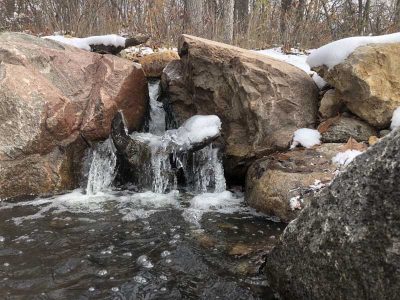Pond Fish In Winter: How To Care For Your Fish When Winter Strikes
Make Sure Your Fish Are All Ready For Des Moines Winters
Pond fish in the winter can either go inside with you or, if you have an ecosystem pond, stay in the pond. Pond fish like koi and goldfish are hardy and can survive winters as cold as 32°Fahrenheit. For them to stay in the pond during winter it needs to be at least 2 feet deep with proper aeration. You can shut off the pumps and remove the filters as long as you use a de-icer, pond aerator, and have the pond set up properly.
You can find out more along with Mary as she looks into what she needs to do to get her pond fish ready for winter.

“I’m telling you the man told me they could stay in the pond over winter,” says Mary for the 5th time.
“You can keep saying that, but I just can’t believe it, not with our winters,” her husband Mike says carefully. “I’m not doubting what you heard, I’m just not sure that pond guy really knows what he’s talking about.”
“Alright then, if you won’t believe him then we can look it up on the Internet and see what everyone else has to say. If they all agree then he has to be right.” Mike replies, “I mean, that makes sense I guess. Let’s do it then.” “Can’t wait to tell you ‘I told you so,’” Mary says under her breath.
“What’s that dear,” Mike questions. “Oh, nothing,” Mary says with a slight smile. “Let’s get on the computer and look for what to do with pond fish in the winter.”
Caring For Pond Fish In Winter
“I told you so,” Mike says triumphantly.
“What are you talking about?” Mary asks. “It says right here that pond fish shouldn’t stay in the pond during winter,” Mike says defensively. “IF,” Mary points out, “if it’s not a suitable pond for fish to stay in through winter. You have to read the whole thing, not just what agrees with you, hon.”
Pond fish can stay in the pond over winter if the pond is made to do so. The pond needs to:
- Be 2 feet deep or more in some areas
- Have proper aeration (more on that later)
- A hole in the ice
Being 2 feet deep or more keeps the water from freezing all the way, even in Iowa. Fish don’t need much room in the winter because they enter a state of hibernation (like bears).

“Wait, fish are like bears? Ha, that’s kind of funny,” Mike laughs. “All I can think about is that bears eat fish and this is comparing them because they both hibernate.”
It’s best to not feed your fish when temperatures reach 50°Fahrenheit and lower because their digestive system slows down t0o much.
Proper aeration means the water can still take in oxygen for the fish to breathe. This means there needs to be an aerator on the bottom or a hole in the ice. This way clean oxygen can get in and nasty gas from fish and decaying matter can escape.
“Ew, gross,” Mary says in disgust. “It’s a good thing we read up on this, otherwise our fish may have ended up trapped in their own….filth.” “Couldn’t we just break a hole in the ice?” Mike asks.
Do not break a hole in the ice or you may end up killing your fish. The break sends shockwaves throughout the water which can hurt or kill your fish. It’s like being suddenly woken up with the entire world shaking and a noise loud enough to give you a heart attack.
As for something to keep a hole in the ice, you can buy a de-icer. It’s basically like a floating heater for the top of your pond that creates a hole in the ice for air exchange.
How To Prepare Your Pond Fish For Winter
“Seems like we should have started prepping our pond during fall,” Mary says regretfully.
“We’ll just have to see about getting it cleaned dear,” Mike sighs. “Well, let’s keep reading so we can know what do to for next year.”
The first place to start is with fall pond maintenance. This is a full pond cleaning to remove organic matter like leaves and sludge from your pond. It’s also a great time to make sure everything works properly from pumps to filters to skimmers. Installing a net over it to catch leaves is also a great idea.

“Mmmm, can’t say I want a net ruining our view of the pond,” Mary says.
Early winter maintenance is also a great idea, especially if you don’t use the net. The less stuff there is on the pond bottom the better time your fish will have and the easier it will be to clean in the spring.
If you have to take them out of the pond, fill up a large tub with water from the pond. You already know the water is good for fish to live in and it makes it easier on them and you. New water means introducing the fish slowly and carefully so they don’t go into shock.
“Whelp,” Mike sighs resignedly, “go ahead and say it, Mary.” “Say what, dear?” Mary responds innocently. “The ‘I told you so’ you’ve been waiting to say.” “I told you so? Why ever would I say ‘I told you so’ dear?” Mary says with a smile.
She kisses Mike on the cheek, saying “Come on, it’s dinner time and I made your favorite. Tomorrow you can call the pond contractor about winterizing our pond.”
Winterizing Ponds Starts In The Fall
The best way to care for your pond fish in winter is to make sure the pond is as clean as possible. You can do it yourself, but it’s a lot of work learning how to winterize a pond.
